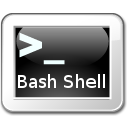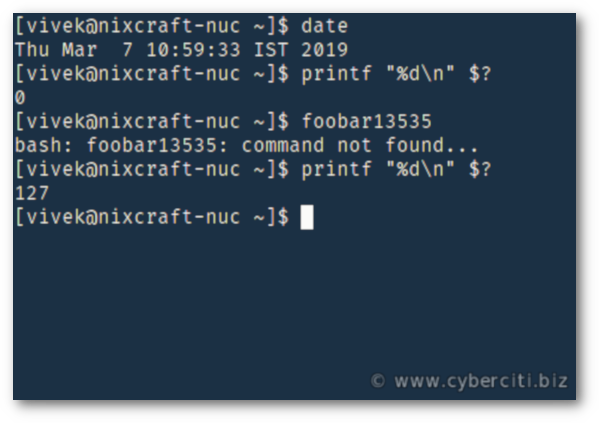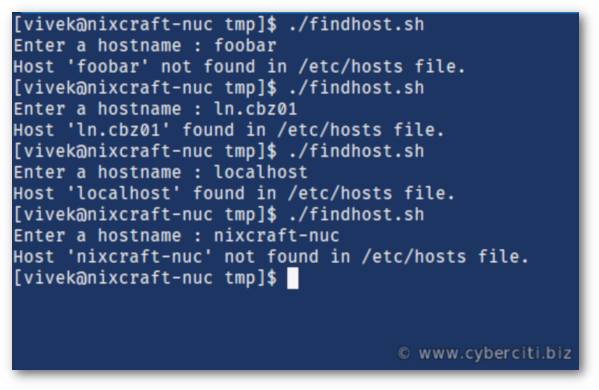
Can you explain bash exit status code? How do I set bash exit status in my Linux shell scripts?
Each Linux or Unix command returns a status when it terminates normally or abnormally. You can use value of exit status in the shell script to display an error message or run commands. For example, if tar command is unsuccessful, it returns a code which tells the shell script to send an e-mail to sysadmins.
More on Linux bash shell exit status codes
- Every Linux or Unix command executed by the shell script or user, has an exit status.
- The exit status is an integer number.
- For the bash shell’s purposes, a command which exits with a zero (0) exit status has succeeded.
- A non-zero (1-255) exit status indicates failure.
- If a command is not found, the child process created to execute it returns a status of 127. If a command is found but is not executable, the return status is 126.
- All of the Bash builtins return exit status of zero if they succeed and a non-zero status on failure.
How do I display the exit status of shell command?
You can use special shell variable called $? to get the exit status of the previously executed command. To print $? variable use the echo command/printf command. The syntax is:command
echo $?
OR/path/to/script.sh
command
date
echo $?
printf "%d\n" $?
## run non-existence command ##
foobar13535
## display status code ##
echo $?
How to store the exit status of the command in a shell variable
Assign $? to a shell variable. The syntax is:
date status=$? echo "The date command exit status : ${status}" |
Linux exit status and the conditional/list constructs
A simple shell script to locate host name (findhost.sh)
#!/bin/bash # set var FILE="/etc/hosts" # get host name read -p "Enter a hostname : " hostname # try to locate hostname/computer name in $FILE grep -q -w "${hostname}" "${FILE}" # store exit status of grep # if found grep will return 0 exit status # if not found, grep will return a nonzero exit status status=$? if test $status -eq 0 then echo "Host '$hostname' found in $FILE file." else echo "Host '$hostname' not found in $FILE file." fi |

How to use the && and || operators with exit codes
The syntax is:
command && echo "success" command || echo "failed" command && echo "success" || echo "failed" |
If a dir named “/tmp/foo” not found create it:[ ! -d "/tmp/foo" ] && mkdir -p "/tmp/foo"
For example, show usage syntax when filename not passed as the command line arg:
#!/bin/Bash _files="$@" ## fail safe ## [[ "$_files" == "" ]] && { echo "Usage: $0 file1.png file2.png"; exit 1; } ## continue below ## |
Here is another shell script that shows usage:
#!/bin/bash set -e I=~/bin/tags.deleted.410 O="/tmp/https.www.cyberciti.biz.410.url.conf" t="$1" [ ! -f "$I" ] && { echo "$I file not found."; exit 10; } [ "$t" == "" ] && { echo "Usage: $0 number-of-urls-to-purge-from-$I"; exit 11; } >$O cat "$I" | sort | uniq | while read -r u do uu="${u##https://www.cyberciti.biz}" echo "~^$uu 1;" >>"${O}" done echo "* Config file created at ${O} ..." echo "* Installing ${O} file on utls-wp-mg-www ..." ~/bin/install.py "${O}" echo "* Send config to rest of cluster nodes ... " ~/bin/install.py --sync --cluster --reload cbz-www echo "* Building list purge urls for Cloudflare CDN ..." sleep 1 url="" while IFS= read -r u do url="$url $u" done <<<"$(tail -${t} ${I})" [ "$url" != "" ] && ~/bin/cloudflare.purge.urls.sh "$url" [ -f "$O" ] && rm -f "$O" |
List of common exit codes for GNU/Linux
| Exit Code | Description |
|---|---|
| 0 | Success |
| 1 | Operation not permitted |
| 2 | No such file or directory |
| 3 | No such process |
| 4 | Interrupted system call |
| 5 | Input/output error |
| 6 | No such device or address |
| 7 | Argument list too long |
| 8 | Exec format error |
| 9 | Bad file descriptor |
| 10 | No child processes |
| 11 | Resource temporarily unavailable |
| 12 | Cannot allocate memory |
| 13 | Permission denied |
| 14 | Bad address |
| 15 | Block device required |
| 16 | Device or resource busy |
| 17 | File exists |
| 18 | Invalid cross-device link |
| 19 | No such device |
| 20 | Not a directory |
| 21 | Is a directory |
| 22 | Invalid argument |
| 23 | Too many open files in system |
| 24 | Too many open files |
| 25 | Inappropriate ioctl for device |
| 26 | Text file busy |
| 27 | File too large |
| 28 | No space left on device |
| 29 | Illegal seek |
| 30 | Read-only file system |
| 31 | Too many links |
| 32 | Broken pipe |
| 33 | Numerical argument out of domain |
| 34 | Numerical result out of range |
| 35 | Resource deadlock avoided |
| 36 | File name too long |
| 37 | No locks available |
| 38 | Function not implemented |
| 39 | Directory not empty |
| 40 | Too many levels of symbolic links |
| 42 | No message of desired type |
| 43 | Identifier removed |
| 44 | Channel number out of range |
| 45 | Level 2 not synchronized |
| 46 | Level 3 halted |
| 47 | Level 3 reset |
| 48 | Link number out of range |
| 49 | Protocol driver not attached |
| 50 | No CSI structure available |
| 51 | Level 2 halted |
| 52 | Invalid exchange |
| 53 | Invalid request descriptor |
| 54 | Exchange full |
| 55 | No anode |
| 56 | Invalid request code |
| 57 | Invalid slot |
| 59 | Bad font file format |
| 60 | Device not a stream |
| 61 | No data available |
| 62 | Timer expired |
| 63 | Out of streams resources |
| 64 | Machine is not on the network |
| 65 | Package not installed |
| 66 | Object is remote |
| 67 | Link has been severed |
| 68 | Advertise error |
| 69 | Srmount error |
| 70 | Communication error on send |
| 71 | Protocol error |
| 72 | Multihop attempted |
| 73 | RFS specific error |
| 74 | Bad message |
| 75 | Value too large for defined data type |
| 76 | Name not unique on network |
| 77 | File descriptor in bad state |
| 78 | Remote address changed |
| 79 | Can not access a needed shared library |
| 80 | Accessing a corrupted shared library |
| 81 | .lib section in a.out corrupted |
| 82 | Attempting to link in too many shared libraries |
| 83 | Cannot exec a shared library directly |
| 84 | Invalid or incomplete multibyte or wide character |
| 85 | Interrupted system call should be restarted |
| 86 | Streams pipe error |
| 87 | Too many users |
| 88 | Socket operation on non-socket |
| 89 | Destination address required |
| 90 | Message too long |
| 91 | Protocol wrong type for socket |
| 92 | Protocol not available |
| 93 | Protocol not supported |
| 94 | Socket type not supported |
| 95 | Operation not supported |
| 96 | Protocol family not supported |
| 97 | Address family not supported by protocol |
| 98 | Address already in use |
| 99 | Cannot assign requested address |
| 100 | Network is down |
| 101 | Network is unreachable |
| 102 | Network dropped connection on reset |
| 103 | Software caused connection abort |
| 104 | Connection reset by peer |
| 105 | No buffer space available |
| 106 | Transport endpoint is already connected |
| 107 | Transport endpoint is not connected |
| 108 | Cannot send after transport endpoint shutdown |
| 109 | Too many references |
| 110 | Connection timed out |
| 111 | Connection refused |
| 112 | Host is down |
| 113 | No route to host |
| 114 | Operation already in progress |
| 115 | Operation now in progress |
| 116 | Stale file handle |
| 117 | Structure needs cleaning |
| 118 | Not a XENIX named type file |
| 119 | No XENIX semaphores available |
| 120 | Is a named type file |
| 121 | Remote I/O error |
| 122 | Disk quota exceeded |
| 123 | No medium found |
| 125 | Operation canceled |
| 126 | Required key not available |
| 127 | Key has expired |
| 128 | Key has been revoked |
| 129 | Key was rejected by service |
| 130 | Owner died |
| 131 | State not recoverable |
| 132 | Operation not possible due to RF-kill |
| 133 | Memory page has hardware error |
The perror command explain error codes which is part of MySQL/MariaDB package:perror 0
perror 1
Conclusion
This page explained bash exit status and related commands. For more info see bash shell man page here.
